December 7, 2021
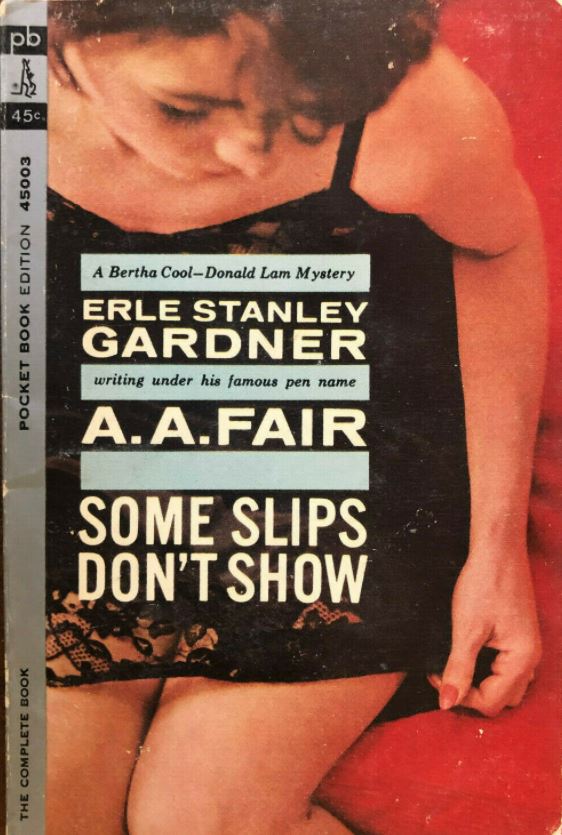 I have had enough A.A. Fair Cocktail Talks and Erle Stanley Gardner Cocktail Talks on the ol’ Spiked Punch for those that don’t know to now know they are the same person, right? Well, the latter, Mr. Erle, is the person I suppose, and the former, Mr. A.A., just a nom de plume (as they say), but I like to hope he at least wore different hats when writing as different people. Anyway, I’ve had a fair (haha!) enough amount of Cocktail Talks as mentioned for you to go back through them to browse my thoughts on the two personas, on the books written by them, and my feelings therein. So, don’t miss that! Cause I’m not going to go over it all here, instead want to jump right in to the drink-y quotes from this book, Some Slips Don’t Show, which stars (as all the A.A. Fair books, I believe) detective Donald Lam, and to a lesser extent, his partner Bertha Cool. In this yarn, they end up with a client who isn’t completely sure if he cheated on his wife while in San Francisco, but may be being blackmailed. Curious! And then there is a murder, and some art, and a modern lady beguiled by the diminutive (in height, somewhat, but not in smarts or stick-tuitive-ness) and dashing Donald, as ladies tend to be. But before said beguiling, there’s background around the client, who it seems had himself a night.
I have had enough A.A. Fair Cocktail Talks and Erle Stanley Gardner Cocktail Talks on the ol’ Spiked Punch for those that don’t know to now know they are the same person, right? Well, the latter, Mr. Erle, is the person I suppose, and the former, Mr. A.A., just a nom de plume (as they say), but I like to hope he at least wore different hats when writing as different people. Anyway, I’ve had a fair (haha!) enough amount of Cocktail Talks as mentioned for you to go back through them to browse my thoughts on the two personas, on the books written by them, and my feelings therein. So, don’t miss that! Cause I’m not going to go over it all here, instead want to jump right in to the drink-y quotes from this book, Some Slips Don’t Show, which stars (as all the A.A. Fair books, I believe) detective Donald Lam, and to a lesser extent, his partner Bertha Cool. In this yarn, they end up with a client who isn’t completely sure if he cheated on his wife while in San Francisco, but may be being blackmailed. Curious! And then there is a murder, and some art, and a modern lady beguiled by the diminutive (in height, somewhat, but not in smarts or stick-tuitive-ness) and dashing Donald, as ladies tend to be. But before said beguiling, there’s background around the client, who it seems had himself a night.
She laughed a throaty, musical laugh. “Trying to play the big, bad wolf was pretty much of a strain on him. He was out of character.”
“I can imagine,” I said. “What happened?”
“He started drinking Champagne like water on top of some fruit punch. The combination didn’t agree with him.”
“So, what happened?”
“He went to the bathroom.”
“Then what?”
“Do you have to know all the details?”
–A.A. Fair, Some Slips Don’t Show
Tags: A.A. Fair, Bertha Cool, Champagne, Cocktail Talk, Cool and Lam, Donald Lam, Erle Stanley Gardner, Part I, Some Slips Don’t Show, sparkling wine
Posted in: Champagne & Sparkling Wine, Cocktail Talk
November 23, 2021
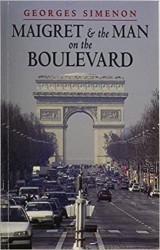 Another quote from the Chief Inspector Maigret yarn I’ve been most recently reading (as opposed to all of those I’ve read in the past: check out all the Maigret Cocktail Talks to get a view into some of them – at least don’t miss the Maigret and the Man on the Boulevard Part I Cocktail Talk, to learn more about this particular book by George Simenon), one where our main character sits down in a very serious and thinking mood at his favorite of all Parisian spots – or the one he visits the most, which is saying something, though it is right across from his office – and gives the waiter a little of the Maigret-ness so many criminal have to deal with.
Another quote from the Chief Inspector Maigret yarn I’ve been most recently reading (as opposed to all of those I’ve read in the past: check out all the Maigret Cocktail Talks to get a view into some of them – at least don’t miss the Maigret and the Man on the Boulevard Part I Cocktail Talk, to learn more about this particular book by George Simenon), one where our main character sits down in a very serious and thinking mood at his favorite of all Parisian spots – or the one he visits the most, which is saying something, though it is right across from his office – and gives the waiter a little of the Maigret-ness so many criminal have to deal with.
“What’s the Veau Marengo like?”
“Excellent, Monsieur Maigret.”
Without realizing it, he was subjecting the waiter to a look that could not have been sterner if he had been a suspect under interrogation.
“Beer, sir?”
“No. A half-bottle of claret.”
He was just being perverse. If the waiter had suggested wine, he would have ordered beer.
–George Simenon, Maigret and the Man on the Boulevard
Tags: beer, Claret, Cocktail Talk, George Simenon, Inspector Maigret, Maigret, Maigret and the Man on the Boulevard, Part II, Veau Marengo
Posted in: beer, Cocktail Talk, Wine
November 16, 2021
 I’m back into another George Simenon yarn starring Parisian Inspector Maigret (there have been many Maigret Cocktail Talks you can browse at will), an ideal read for a rainy November day, as during a fair part of Maigret and the Man on the Boulevard Paris is engulfed in heavy rains. And our stolid, stoic, Chief Inspector (to give him his full due) moves along through the wet and dry and cloudy days in his own particular way: slow at times, thoughtful at times, dreamy (can I say that? I did!) at times, but always pushing forward. His case this time involves the murder of a man who had a second-life of sorts, pointed out first by the fact that he was murdered wearing light brown shoes, shoes which his wife swears he didn’t own, and which Maigret calls “goose-dung” shoes, due to the color. That’s amazing! Maigret follows the various threads, spooling them up one-by-one, while stopping for various sips along the way: wine, Calvados, aperitives, more, maybe even more than usual (one of the many reasons I love Maigret so much is his love of bars, bistros, brasseries, and other eating-and-watering holes. Even when they are around-the-corner, as in the below).
I’m back into another George Simenon yarn starring Parisian Inspector Maigret (there have been many Maigret Cocktail Talks you can browse at will), an ideal read for a rainy November day, as during a fair part of Maigret and the Man on the Boulevard Paris is engulfed in heavy rains. And our stolid, stoic, Chief Inspector (to give him his full due) moves along through the wet and dry and cloudy days in his own particular way: slow at times, thoughtful at times, dreamy (can I say that? I did!) at times, but always pushing forward. His case this time involves the murder of a man who had a second-life of sorts, pointed out first by the fact that he was murdered wearing light brown shoes, shoes which his wife swears he didn’t own, and which Maigret calls “goose-dung” shoes, due to the color. That’s amazing! Maigret follows the various threads, spooling them up one-by-one, while stopping for various sips along the way: wine, Calvados, aperitives, more, maybe even more than usual (one of the many reasons I love Maigret so much is his love of bars, bistros, brasseries, and other eating-and-watering holes. Even when they are around-the-corner, as in the below).
“Where to now chief?”
It was just eleven o’clock.
“Stop at the first bistro you come to.”
“There’s one next door to the shop.”
Somehow, he felt shy of going in there, under Leone’s watchful eye.
“We’ll find one round the corner.”
He wanted to ring Monsieur Kaplan, and to consult the street guide, to find Monsieur Saimbron’s exact address on the Quai de la Megisserie.
While he was there, having started the day with a Calvados, he thought he might as well have another, and drank it standing at the bar counter.
–George Simenon, Maigret and the Man on the Boulevard
November 9, 2021
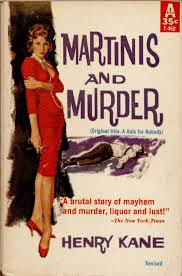 Well, what I can I say about the Henry Kane hard-boiled pocket-sized slurper Martinis and Murder which hasn’t been said in the Martinis and Murder Cocktail Talks Part I, Part II, Part III, and Part IV? Well, nothing really (and, really, the cover says it all!), so let’s just get to the below quote – you can catch up on the rest by reviewing the past posts while you sip something nice and potent.
Well, what I can I say about the Henry Kane hard-boiled pocket-sized slurper Martinis and Murder which hasn’t been said in the Martinis and Murder Cocktail Talks Part I, Part II, Part III, and Part IV? Well, nothing really (and, really, the cover says it all!), so let’s just get to the below quote – you can catch up on the rest by reviewing the past posts while you sip something nice and potent.
We danced all through it, comfortably and close. We drank brandy from big Napoleon glasses. The music got hot. The place filled up, got warm and noisy.
“Peter,” she said, inhaling smoke through a long holder with a finger loop, “I’m beginning not to like it here. Can’t we go somewhere else where it is quieter?”
“Do you like Sibelius?”
“I adore Sibelius.”
“I have Sibelius in quantities on wax discs and I have a lovely fireplace and I have oil paintings that cost me much, and I have a book of pornographic studies dating back to the fifteenth century. No etchings. But I have Pernod.”
“Sibelius and Pernod. You are a wicked man”
–Henry Kane, Martinis and Murder
November 2, 2021
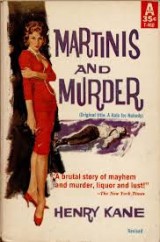 Way back now, oh, 6 years ago (wowza, times flies) or thereabouts I first read the Henry Kane pulper Martinis and Murder, starring detective, drinker, dancer (well, probably), romancer (certainly), and puncher Peter Chambers. And had a number of Cocktail Talks from it (check out Martinis and Murder Part I, Part II, and Part III to get caught up a bit). But recently I was hankering for some pocket-sized pulp reading, as I often am, and was pulled in by its catchy title and even-more-catchy cover, so re-read it. And, you know what? I found even more Cocktail Talk worthy quotes. The book is spilling boozy goodness (around some murdering and mystery-ing and hard-boiled action and smooching and such). Heck, in six years from now, I’ll probably read it again, and find even more potable quotables. But for today, let’s go with the below.
Way back now, oh, 6 years ago (wowza, times flies) or thereabouts I first read the Henry Kane pulper Martinis and Murder, starring detective, drinker, dancer (well, probably), romancer (certainly), and puncher Peter Chambers. And had a number of Cocktail Talks from it (check out Martinis and Murder Part I, Part II, and Part III to get caught up a bit). But recently I was hankering for some pocket-sized pulp reading, as I often am, and was pulled in by its catchy title and even-more-catchy cover, so re-read it. And, you know what? I found even more Cocktail Talk worthy quotes. The book is spilling boozy goodness (around some murdering and mystery-ing and hard-boiled action and smooching and such). Heck, in six years from now, I’ll probably read it again, and find even more potable quotables. But for today, let’s go with the below.
I came back and I asked, “How about some of the finest Sidecars ever concocted?”
“If you let me watch.”
“Why not?”
She trailed behind me. I turned and pushed her against the wall of the kitchen and kissed her hard.
“That for inspiration? she gasped.
“That’s for nothing,” I said.
I went to work with lemons and Cointreau and Cognac.
We brought the mixer into the living room, and in no time at all, fleece gathered.
–Henry Kane, Martinis and Murder
October 26, 2021
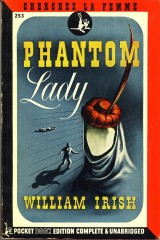 I went down a large Cornell Woolrich hole at one point in my life, and in some ways never came out (perhaps I’m not in as deep as I once was, which isn’t to say my liking of books by said author is less, but maybe to say I’ve read such a fair amount of those available that there aren’t that many more readily available) – heck, check out the past Cornell Woolrich Cocktail Talks for evidence. There are a fair few of them! You’ll get lots of background on this, the noir-y-est (in many ways – I mean, no mystery writer uses the word “black” in more titles for a start, but also he’s such a master of psychological dark moods and mental, as well as action-driven, thrillers that seem going down a dark path) of the pulp writers, perhaps. He also wrote under a couple pseudonyms, the best-known being William Irish, under-which name he became famous enough that I have a copy of The Best of William Irish which I was recently re-reading. Featuring two full-length reads and a handful of stories, the book’s highlight may well be “Rear Window” (from which the legendary movie was made, which you should re-watch right now), which, funny enough, I think was pub’d under Cornell’s own name originally (and originally called “It Had to be Murder”). But if you have a story which a famous movie is based on, you work it in. The whole collection starts with perhaps the most famous William Irish-monikered tale (though that could be debated), the novel Phantom Lady, which I am also lucky enough to have as a standalone book, and which was also made into a movie in 1944, a movie I haven’t seen, but would love to! The book’s chapters all countdown to an execution (28 Days Before the Execution, etc.), which gives an insight into the plot: a man is accused – falsely, we know – of the murder of his wife, with only one possible way to convince the police he’s innocent, finding of a missing woman who can place him at a bar at a particular time. It’s a good read and then some, keeping you moving and twisting around this way and that way, with a few more murders and lots of surprises. Having a bar with a key role doesn’t hurt, either, and neither does the mention of Jack Rose cocktails, among others, in the below Cocktail Talk quote.
I went down a large Cornell Woolrich hole at one point in my life, and in some ways never came out (perhaps I’m not in as deep as I once was, which isn’t to say my liking of books by said author is less, but maybe to say I’ve read such a fair amount of those available that there aren’t that many more readily available) – heck, check out the past Cornell Woolrich Cocktail Talks for evidence. There are a fair few of them! You’ll get lots of background on this, the noir-y-est (in many ways – I mean, no mystery writer uses the word “black” in more titles for a start, but also he’s such a master of psychological dark moods and mental, as well as action-driven, thrillers that seem going down a dark path) of the pulp writers, perhaps. He also wrote under a couple pseudonyms, the best-known being William Irish, under-which name he became famous enough that I have a copy of The Best of William Irish which I was recently re-reading. Featuring two full-length reads and a handful of stories, the book’s highlight may well be “Rear Window” (from which the legendary movie was made, which you should re-watch right now), which, funny enough, I think was pub’d under Cornell’s own name originally (and originally called “It Had to be Murder”). But if you have a story which a famous movie is based on, you work it in. The whole collection starts with perhaps the most famous William Irish-monikered tale (though that could be debated), the novel Phantom Lady, which I am also lucky enough to have as a standalone book, and which was also made into a movie in 1944, a movie I haven’t seen, but would love to! The book’s chapters all countdown to an execution (28 Days Before the Execution, etc.), which gives an insight into the plot: a man is accused – falsely, we know – of the murder of his wife, with only one possible way to convince the police he’s innocent, finding of a missing woman who can place him at a bar at a particular time. It’s a good read and then some, keeping you moving and twisting around this way and that way, with a few more murders and lots of surprises. Having a bar with a key role doesn’t hurt, either, and neither does the mention of Jack Rose cocktails, among others, in the below Cocktail Talk quote.
He said, “I had a Scotch and water. I always have that, never anything else. Give me just a minute now, to see if I can get hers. It was all the way down near the bottom –“
The barman came back with a large tin box.
Henderson said, rubbing his forehead, “There was a cherry left in the bottom of the glass and – “
“That could be any one of six drinks. I’ll get it for you. Was the bottom stemmed or flat? And what color was the dregs? If it was a Manhattan the glass was stemmed and dregs, brown.”
Henderson said, “It was a stem-glass, she was fiddling with it. But the dregs weren’t brown, now, they were pink, like.”
“Jack Rose,” said the barman briskly. “I can get it for you easy, now.”
–Cornell Woolrich (writing as William Irish), Phantom Lady
Tags: apple brandy, applejack, Bars, Cocktail Talk, Cornell Woolrich, grenadine, Jack Rose, lemon, Manhattan, Phantom Lady, Scotch, Scotch and water, sweet vermouth, Whiskey, William Irish
Posted in: Bars, Brandy, Cocktail Talk, Manhattan, Scotch, vermouth, Whiskey
October 19, 2021
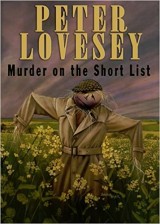 It’s a smidgen odd that I haven’t had more Peter Lovesey Cocktail Talks here on the ol’ Spiked Punch, just as I read and re-read his books (especially his Peter Diamond mysteries) as much as nearly any written words. Though, on the flip side, he doesn’t dwell in the bars and boozes as much as some, so maybe not so strange? Anyway, before I ramble so far we end up lost in the English countryside, today we are having a Lovesey Cocktail Talk, with a quote from the story “Bullets,” which I recently re-read when I was re-reading his killer (hahaha) collection, Murder on the Short List, a collection full of mysteries and mysterious deaths, some featuring a couple of his classic characters and some not. While I may shade my favoritism towards the longer works, many like his stories best, and he is a master – all of which is to say, pick this book up if you see it. This particular short story starts with an inspector getting ready to talk to the relatives of man found dead in his study, supposedly (!) by suicide.
It’s a smidgen odd that I haven’t had more Peter Lovesey Cocktail Talks here on the ol’ Spiked Punch, just as I read and re-read his books (especially his Peter Diamond mysteries) as much as nearly any written words. Though, on the flip side, he doesn’t dwell in the bars and boozes as much as some, so maybe not so strange? Anyway, before I ramble so far we end up lost in the English countryside, today we are having a Lovesey Cocktail Talk, with a quote from the story “Bullets,” which I recently re-read when I was re-reading his killer (hahaha) collection, Murder on the Short List, a collection full of mysteries and mysterious deaths, some featuring a couple of his classic characters and some not. While I may shade my favoritism towards the longer works, many like his stories best, and he is a master – all of which is to say, pick this book up if you see it. This particular short story starts with an inspector getting ready to talk to the relatives of man found dead in his study, supposedly (!) by suicide.
They were sitting at the kitchen table in 7, Albert Street, their small suburban house in Teddington. They had a bottle of brandy between them.
The inspector accepted a drink and knocked it back in one swig. When talking to the recently bereaved he needed all the lubrication he could get.
–Peter Lovesey, “Bullets”
October 12, 2021
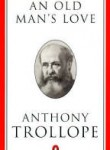 I wasn’t sure we’d have two An Old Man’s Love Cocktail Talks, as it’s a quicker read (especially in comparison with many Trollope gems). However, here we are! I had to feature the quote in Part I (read it, to find out why, and to find out more about the book, the last full novel written by the English great, and for even more, check out all the Trollope Cocktail Talks), and then when mulling things over, didn’t want to miss the below, either. In it, we learn our lead character has had drinking whiskey as a doctor’s recommendation – something that doesn’t happen enough today!
I wasn’t sure we’d have two An Old Man’s Love Cocktail Talks, as it’s a quicker read (especially in comparison with many Trollope gems). However, here we are! I had to feature the quote in Part I (read it, to find out why, and to find out more about the book, the last full novel written by the English great, and for even more, check out all the Trollope Cocktail Talks), and then when mulling things over, didn’t want to miss the below, either. In it, we learn our lead character has had drinking whiskey as a doctor’s recommendation – something that doesn’t happen enough today!
He had, indeed, felt but little his want of success in regard to money, but he had encountered failure in one or two other matters which had touched him nearly. In some things his life had been successful; but these were matters in which the world does not write down a man’s good luck as being generally conducive to his happiness. He had never had a headache, rarely a cold, and not a touch of the gout. One little finger had become crooked, and he was recommended to drink whisky, which he did willingly,—because it was cheap. He was now fifty, and as fit, bodily and mentally, for hard work as ever he had been.
–Anthony Trollope, An Old Man’s Love
 I have had enough A.A. Fair Cocktail Talks and Erle Stanley Gardner Cocktail Talks on the ol’ Spiked Punch for those that don’t know to now know they are the same person, right? Well, the latter, Mr. Erle, is the person I suppose, and the former, Mr. A.A., just a nom de plume (as they say), but I like to hope he at least wore different hats when writing as different people. Anyway, I’ve had a fair (haha!) enough amount of Cocktail Talks as mentioned for you to go back through them to browse my thoughts on the two personas, on the books written by them, and my feelings therein. So, don’t miss that! Cause I’m not going to go over it all here, instead want to jump right in to the drink-y quotes from this book, Some Slips Don’t Show, which stars (as all the A.A. Fair books, I believe) detective Donald Lam, and to a lesser extent, his partner Bertha Cool. In this yarn, they end up with a client who isn’t completely sure if he cheated on his wife while in San Francisco, but may be being blackmailed. Curious! And then there is a murder, and some art, and a modern lady beguiled by the diminutive (in height, somewhat, but not in smarts or stick-tuitive-ness) and dashing Donald, as ladies tend to be. But before said beguiling, there’s background around the client, who it seems had himself a night.
I have had enough A.A. Fair Cocktail Talks and Erle Stanley Gardner Cocktail Talks on the ol’ Spiked Punch for those that don’t know to now know they are the same person, right? Well, the latter, Mr. Erle, is the person I suppose, and the former, Mr. A.A., just a nom de plume (as they say), but I like to hope he at least wore different hats when writing as different people. Anyway, I’ve had a fair (haha!) enough amount of Cocktail Talks as mentioned for you to go back through them to browse my thoughts on the two personas, on the books written by them, and my feelings therein. So, don’t miss that! Cause I’m not going to go over it all here, instead want to jump right in to the drink-y quotes from this book, Some Slips Don’t Show, which stars (as all the A.A. Fair books, I believe) detective Donald Lam, and to a lesser extent, his partner Bertha Cool. In this yarn, they end up with a client who isn’t completely sure if he cheated on his wife while in San Francisco, but may be being blackmailed. Curious! And then there is a murder, and some art, and a modern lady beguiled by the diminutive (in height, somewhat, but not in smarts or stick-tuitive-ness) and dashing Donald, as ladies tend to be. But before said beguiling, there’s background around the client, who it seems had himself a night.


























